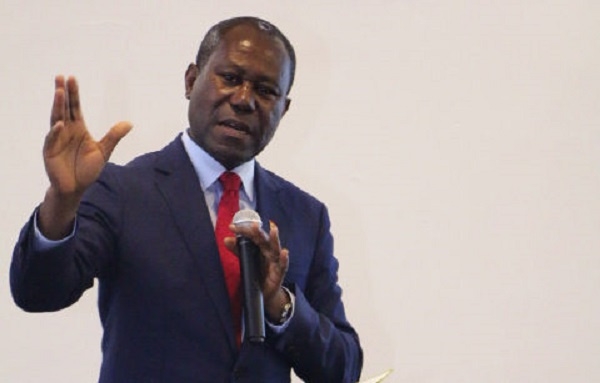Minority's claim we were rejected by int'l banks false - COCOBOD
 Joseph Boahen Aidoo
Joseph Boahen Aidoo
COCOBOD has strongly denied allegations made by the Minority, led by Dr Cassiel Ato Forson that it was rejected by international banks in its attempt to secure a $1.5 billion loan for the 2024/2025 cocoa crop season due to poor financial health.
In a statement issued on August 22, COCOBOD refuted these claims, stating that syndicated banks had indeed submitted term sheets in response to its Request for Proposals (RFP), demonstrating confidence in its creditworthiness.
COCOBOD also criticised the Minority for spreading "falsehoods and inaccuracies" about the cocoa sector and rejected the claim that its move to source funding domestically was a "face-saving" measure.
Below are details of the statement from COCOBOD:
The Ghana Cocoa Board (COCOBOD) has taken note of the press release issued by the Minority in Parliament on 21st August 2024, which contains several falsehoods, inaccuracies, and misrepresentations regarding the current state of the cocoa sector and COCOBOD’s decision to wean itself of syndicated external borrowing to create more value for farmers.
A Complete Lie about the Paradigm Shift
The assertion by the Minority Caucus that the International Banks have rejected the Ghana Cocoa Board’s request and that COCOBOD was ‘chased away’ from the market is false. This is so because syndicated banks submitted term sheets in response to COCOBOD’s earlier Request for Proposals (RFP) for consideration.
Indeed, notwithstanding our intentions to wean off syndicated transactions, we still have committed contracts that need to be fulfilled through the syndicated process.
These transactions have necessitated a discussion with financial institutions, and nothing in this process indicates, to us, a lack of confidence in COCOBOD’s creditworthiness from these financial institutions.
Source of Funding for Cocoa Purchases
For the avoidance of doubt, the proposed decision to explore non-syndicated funding is part of a broader strategy to diversify our sources of funding, making the Board more self-financing and sustainable in the medium to long term, deriving more value for farmers and retaining more value within the Ghanaian economy.
Profitability in the 2022/2023 Crop Season
The Minority’s claim that the Board has made continuous losses is highly uninformed, and to say that COCOBOD made a loss of GHS4.2 billion in 2023 is false. In fact, COCOBOD’s 2023 accounts audited by Ernst & Young (EY) show a profit of GHS2.3 billion during the 2022/2023 Crop Season, marking a significant turnaround from the previous year’s performance. This financial success is a demonstration of the effectiveness of the strategic initiatives undertaken by COCOBOD, including cost-cutting measures, improved operational efficiency, and targeted investments in key areas of the cocoa sector.
Financial Performance and Sustainability
The Minority’s claim that COCOBOD’s decision to source funding domestically is a ‘face-saving’ measure to hide its financial difficulties is categorically untrue.
As a matter of fact, whereas world market prices from 2017 to 2022 were record low (down 30 percent), producer prices were sustained to safeguard and sustain the industry. The Minority cannot deny that the same period of financial challenges has witnessed massive investments in key innovations, interventions, and productivity enhancement programmes including digitization of cocoa farmer households and farms into a comprehensive cocoa farmer data base, national cocoa traceability system, pruning of cocoa farms, hand pollination, the introduction and use of motorized pruner-slasher machines, and rehabilitation of cocoa swollen shoot virus diseased (CSSVD) farms, a fundamental debilitating condition for which the NDC government under former President John Mahama failed to achieve.
Historic Cocoa Production Volumes
The assertion by the Minority about consistent reduction in production under the current management of COCOBOD is false. It is important to note that Ghana recorded its highest-ever cocoa production volume of 1.045 million metric tonnes during the 2020/2021 crop season. This historic achievement was a direct result of effective management practices and targeted interventions by the Board, including improved agronomic practices, enhanced farmer support, and strategic investments in the cocoa sector.
While recent production levels have faced structural challenges, including adverse weather conditions (i.e., last year’s devastating El Nino force majeure) and the impact of the CSSVD, it must be reiterated that COCOBOD has implemented significantinterventions and mitigation measures.
The Minority is fully aware that the future of Ghana’s cocoa has been secured with the successful rehabilitation of 74,813 farms spanning 67,385.43 hectares, owned by 56,105 farmers. These farms now thrive with hybrid, disease-tolerant cocoa varieties that have started bearing fruits, and the volume of cocoa from these farms will continue to increase in the years ahead. Out of the 74,813 farms rehabilitated and now at various stages of growth, 44,480 farms covering 40,150.40 hectares, belonging to 28,510 farmers, are yielding as of August 2024 and will soon be handed back to their owners.
Because of the positive measures and programmes currently being infused into the sector, cocoa farms in the transition belt that were converted into cashew cultivation when the Minority were in power with former President John Mahama are being turned back to cocoa under the present government.
Commitment to the Cocoa Sector
Contrary to the Minority’s claims, the NPP government remains fully committed to the cocoa sector. The government has invested heavily in the sector, including the construction of roads in cocoa-growing areas, the provision of subsidized fertilizers and pesticides to farmers, and the implementation of the cocoa rehabilitation programme.
The claim that the Government has “destroyed” the cocoa sector is false, and fails to recognize the complexities of the global cocoa industry and the proactive steps being taken by COCOBOD and the Government to ensure the long-term sustainability of Ghana’s cocoa industry.
Conclusion
COCOBOD urges the public to disregard the Minority’s press release, which seeks to politicize a strategic and forward-thinking policy decision. The Board remains focused on its mandate to sustain and grow the cocoa industry, ensuring that it continues to contribute meaningfully to Ghana’s economy and the livelihoods of cocoa farmers across the country. COCOBOD invites all stakeholders, including members of the Minority, to engage in constructive dialogue and collaboration to support the continued growth and development of Ghana’s cocoa sector.
Trending Business

Better Ghana Alliance rebuts DPPF’s hailing of KGL as Africa’s top lotto company
09:13
New policies will hurt mining sector growth - Minority to gov’t
08:27
Ato Forson leads Ghana to participate in first IMF /World Bank Spring Meetings in Washington DC
02:50
SIC Insurance courts GPHA to expand insurance partnership
01:14
Mahama urges Africa to leverage global shifts for economic tansformation
11:07
Energy expert warns new electricity tariffs could fuel unemployment
08:05
Easter: Kwahu Obomeng Queen Mother cautions against price hikes
02:31
Gold Fields: Damang youth push for local ownership and content
16:01
ECG assures stable power supply for Easter festivities in Kwahu
12:02
Communications Minister summons EMIs over rising fraud cases
12:30



